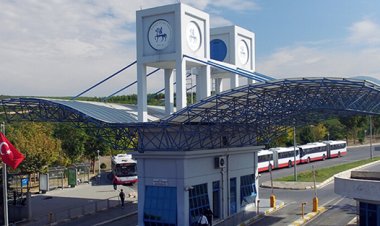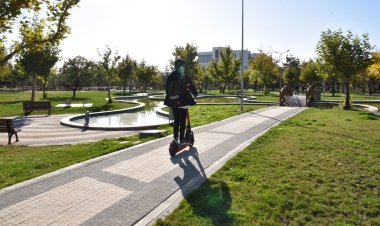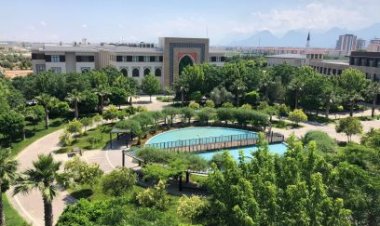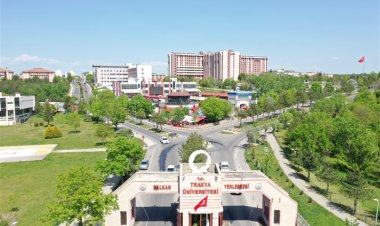Kök ucu açık dişlerde sonlu elemanlar analizi kullanılarak farklı yönlerden gelen travmaların oluşturduğu streslerin değerlendirilmesi
Kök ucu açık dişlerde sonlu elemanlar analizi kullanılarak farklı yönlerden gelen travmaların oluşturduğu streslerin değerlendirilmesi Özdemir, Selin Bilgin; Kahvecioğlu, Firdevs Amaç: Açık apeksli bir dişin farklı materyallerle yapılan endodontik tedavisi sonrasında oluşabilecek ikincil bir travmanın dişin hangi bölgesinde ve ne kadar yoğunlukta stres oluşturacağını sonlu elemanlar yöntemi kullanarak belirlemektir. Aynı zamanda meydana gelen stres yoğunluklarının kullanılan kök kanal dolum materyaline göre değişip değişmeyeceği ve hangi kök kanal dolum materyalinin dişi travmaya karşı daha dayanıklı hale getirebileceği konusunda fikir sahibi olmaktır. Gereç Ve Yöntemler: Çalışmamızda kök ucu açık santral dişin 3 boyutlu doku modeli oluşturularak 4 farklı diş grubu oluşturuldu. Grup 1; Sağlıklı diş modeli, grup 2; MTA ile kanal dolumu yapılmış diş modeli, grup 3; Biodentin ile kanal dolumu yapılmış diş modeli, grup 4; Güta-perka ile kanal dolumu yapılmış diş modeli olarak simüle edildi. Sonlu elemanlar analizi kullanılarak, gruplara 100 N, 500 N ve 800 N’luk kuvvetler horizontal, oblik ve vertikal yönlerde uygulandı. Uygulanan kuvvetler sonucunda diş dokularında meydana gelen von Mises stres ve deformasyon miktarları değerlendirildi. Bulgular: Vertikal kuvvetler karşısında en dayanıklı dişin, MTA uygulanmış diş olduğu bulundu. Dişte oluşan stres miktarları değerlendirildiğinde, MTA’nın kullanılan diğer materyallere gore dişi travmatik kuvvetlere karşı daha dayanıklı hale getirdiği görüldü. Horizontal ve oblik kuvvetlerde Biodentin’in dişi fraktür riskine karşı yeterince güçlendirmediği görülürken, vertikal kuvvetlerde iyi sonuçlar göstermiştir. Sonuç: Horizontal ve oblik kuvvetler uygulandığında ortaya çıkan sonuç, travmatik kuvvetler karşısında fraktüre en dayanıklı grubun sağlıklı diş grubu olduğudur.; Background: In which region of the tooth and how intense the stress will occur in a secondary trauma that can occur after an endodontic treatment with an open apex tooth with different materials is determined using the finite element method. At the same time, it is to have an idea about the intensity of the stresses occur, depending on the root canal filling material used, and which root canal filling material can make the tooth more resistant to trauma. Methods: In our study, four different groups of teeth were formed by creating a three dimensional tissue model of the teeth with open apex. It was simulated as; group 1; Healthy tooth model, group 2; The canal-filled tooth model with MTA, group 3; The canal-filled tooth model with Biodentine, group 4; The canal-filled tooth model with Gutta-percha. Using finite element analysis, 100 N, 500 N and 800 N forces were applied to the groups in horizontal, oblique and vertical directions. As a result of the applied forces, von Mises stress and deformation amounts in the teeth tissues were evaluated. Results: Horizontal and oblique forces against the most resistant teeth healthy teeth, vertical forces against the most resistant teeth, MTA applied tooth was found. When the amount of stress on the teeth was evaluated, it was seen that the MTA made it more resistant to teeth against traumatic forces than the other materials used. However, since there is not enough work in the literature in this regard, more work is needed. Conclusion: The most resistant group against horizontal and oblique forces was found as the Group 1, healthy dental group.
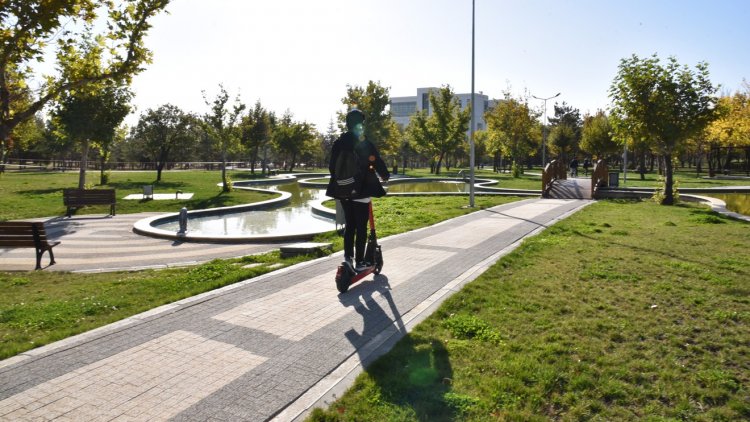
Kök ucu açık dişlerde sonlu elemanlar analizi kullanılarak farklı yönlerden gelen travmaların oluşturduğu streslerin değerlendirilmesi Özdemir, Selin Bilgin; Kahvecioğlu, Firdevs Amaç: Açık apeksli bir dişin farklı materyallerle yapılan endodontik tedavisi sonrasında oluşabilecek ikincil bir travmanın dişin hangi bölgesinde ve ne kadar yoğunlukta stres oluşturacağını sonlu elemanlar yöntemi kullanarak belirlemektir.
Aynı zamanda meydana gelen stres yoğunluklarının kullanılan kök kanal dolum materyaline göre değişip değişmeyeceği ve hangi kök kanal dolum materyalinin dişi travmaya karşı daha dayanıklı hale getirebileceği konusunda fikir sahibi olmaktır. Gereç Ve Yöntemler: Çalışmamızda kök ucu açık santral dişin 3 boyutlu doku modeli oluşturularak 4 farklı diş grubu oluşturuldu. Grup 1; Sağlıklı diş modeli, grup 2; MTA ile kanal dolumu yapılmış diş modeli, grup 3; Biodentin ile kanal dolumu yapılmış diş modeli, grup 4; Güta-perka ile kanal dolumu yapılmış diş modeli olarak simüle edildi. Sonlu elemanlar analizi kullanılarak, gruplara 100 N, 500 N ve 800 N’luk kuvvetler horizontal, oblik ve vertikal yönlerde uygulandı.
Uygulanan kuvvetler sonucunda diş dokularında meydana gelen von Mises stres ve deformasyon miktarları değerlendirildi. Bulgular: Vertikal kuvvetler karşısında en dayanıklı dişin, MTA uygulanmış diş olduğu bulundu. Dişte oluşan stres miktarları değerlendirildiğinde, MTA’nın kullanılan diğer materyallere gore dişi travmatik kuvvetlere karşı daha dayanıklı hale getirdiği görüldü. Horizontal ve oblik kuvvetlerde Biodentin’in dişi fraktür riskine karşı yeterince güçlendirmediği görülürken, vertikal kuvvetlerde iyi sonuçlar göstermiştir.
Sonuç: Horizontal ve oblik kuvvetler uygulandığında ortaya çıkan sonuç, travmatik kuvvetler karşısında fraktüre en dayanıklı grubun sağlıklı diş grubu olduğudur.;
Background: In which region of the tooth and how intense the stress will occur in a secondary trauma that can occur after an endodontic treatment with an open apex tooth with different materials is determined using the finite element method. At the same time, it is to have an idea about the intensity of the stresses occur, depending on the root canal filling material used, and which root canal filling material can make the tooth more resistant to trauma. Methods: In our study, four different groups of teeth were formed by creating a three dimensional tissue model of the teeth with open apex. It was simulated as; group 1; Healthy tooth model, group 2; The canal-filled tooth model with MTA, group 3; The canal-filled tooth model with Biodentine, group 4; The canal-filled tooth model with Gutta-percha. Using finite element analysis, 100 N, 500 N and 800 N forces were applied to the groups in horizontal, oblique and vertical directions. As a result of the applied forces, von Mises stress and deformation amounts in the teeth tissues were evaluated. Results: Horizontal and oblique forces against the most resistant teeth healthy teeth, vertical forces against the most resistant teeth, MTA applied tooth was found. When the amount of stress on the teeth was evaluated, it was seen that the MTA made it more resistant to teeth against traumatic forces than the other materials used. However, since there is not enough work in the literature in this regard, more work is needed. Conclusion: The most resistant group against horizontal and oblique forces was found as the Group 1, healthy dental group.

 Bilgi
Bilgi 







